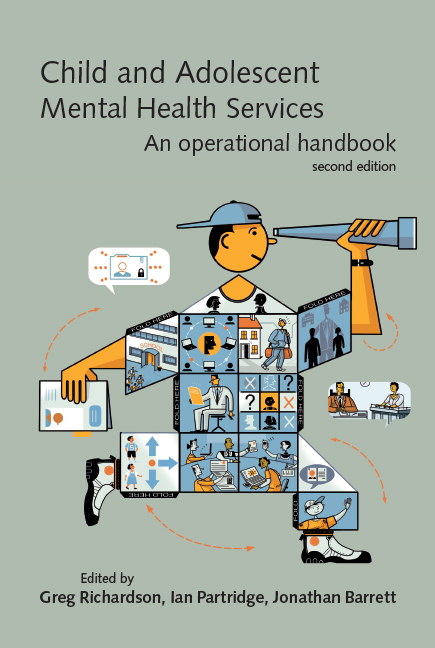Book contents
- Frontmatter
- Contents
- Tables, boxes and figures
- Contributors
- Abbreviations
- Preface
- 1 Introduction
- 2 CAMHS in context
- 3 CAMHS and the law
- 4 Structure, organisation and management of CAMHS
- 5 Evidence-based practice
- 6 Clinical governance
- 7 Education, supervision and workforce development
- 8 Multidisciplinary working
- 9 User and carer participation and advocacy
- 10 A comprehensive CAMHS
- 11 Referral management
- 12 Demand and capacity management
- 13 Strategies for working with Tier 1
- 14 Structuring and managing treatment options
- 15 CAMHS in the emergency department
- 16 Paediatric liaison
- 17 Self-harm
- 18 Learning disability services
- 19 Services for autism-spectrum disorders
- 20 Attentional problems services
- 21 Eating disorder teams
- 22 Bereavement services
- 23 CAMHS for refugees and recent immigrants
- 24 CAMHS and looked-after children
- 25 Drug and alcohol teams
- 26 Parenting risk assessment service
- 27 Court work
- 28 Tier 4 options
- 29 In-patient psychiatric care
- 30 Forensic services
- 31 Neuropsychiatry and neuropsychology services
- 32 Mental health provision for deaf children: study of a low-incidence service provision
- 33 Chief Executives – what do they want and how do they get it?
- Index
24 - CAMHS and looked-after children
- Frontmatter
- Contents
- Tables, boxes and figures
- Contributors
- Abbreviations
- Preface
- 1 Introduction
- 2 CAMHS in context
- 3 CAMHS and the law
- 4 Structure, organisation and management of CAMHS
- 5 Evidence-based practice
- 6 Clinical governance
- 7 Education, supervision and workforce development
- 8 Multidisciplinary working
- 9 User and carer participation and advocacy
- 10 A comprehensive CAMHS
- 11 Referral management
- 12 Demand and capacity management
- 13 Strategies for working with Tier 1
- 14 Structuring and managing treatment options
- 15 CAMHS in the emergency department
- 16 Paediatric liaison
- 17 Self-harm
- 18 Learning disability services
- 19 Services for autism-spectrum disorders
- 20 Attentional problems services
- 21 Eating disorder teams
- 22 Bereavement services
- 23 CAMHS for refugees and recent immigrants
- 24 CAMHS and looked-after children
- 25 Drug and alcohol teams
- 26 Parenting risk assessment service
- 27 Court work
- 28 Tier 4 options
- 29 In-patient psychiatric care
- 30 Forensic services
- 31 Neuropsychiatry and neuropsychology services
- 32 Mental health provision for deaf children: study of a low-incidence service provision
- 33 Chief Executives – what do they want and how do they get it?
- Index
Summary
‘Change is not made without inconvenience, even from worse to better.’
Richard Hooker, Of The Lawes of Ecclesiastical PolitieIntroduction
There are assorted reasons for children being ‘looked after’. A proportion will have suffered physical, sexual or emotional abuse, and parental mental illness. Marital violence, relationship breakdown and parental imprisonment are not uncommon experiences. These children can be seen as enmeshed in a matrix of developmental disadvantage, and have a higher number of risk factors predisposing them to mental health problems. They may already have significant mental health problems as they enter care (Dimigen et al, 1999).
The care system presents these young people with further challenges and difficulties, particularly frequent moves and placement breakdowns (Quinton & Rutter, 1984; Minty, 1999), which may influence their already vulnerable state, interacting with and interrelated to social, educational and relationship difficulties. A cycle evolves whereby children with mental health problems are less likely to achieve placement stability, and therefore become more vulnerable (Barber et al, 2001).
‘Upon rereading my old diaries, I realised how hard foster care was and what a detrimental effect it had on me at that time. Before my first foster placement broke down, I thought foster care was a relatively positive experience, apart from the usual problem of occasionally feeling a bit awkward around the family, but when my foster care placement did breakdown, literally overnight, I realised why some young people in care do have the problems they do. I became very defensive and was determined to never let anyone ever hurt me ever again. I developed a very hard exterior to protect me at that time.’
(Cuckston, 2004: p. 24)A study in Oxfordshire, which looked at the mental health needs of looked-after children, found that 97% of children living within residential care and 57% of children living in foster care were found to have significant mental health problems (McCann et al, 1996). In their research on the mental health of looked-after children aged 5–17 years of age in England, Meltzer et al (2003) discovered that 45% of these children had a mental disorder, 36% a conduct disorder, 12% an emotional disorder and 7% were rated as hyperactive.
- Type
- Chapter
- Information
- Child and Adolescent Mental Health ServicesAn Operational Handbook, pp. 226 - 233Publisher: Royal College of PsychiatristsFirst published in: 2017



